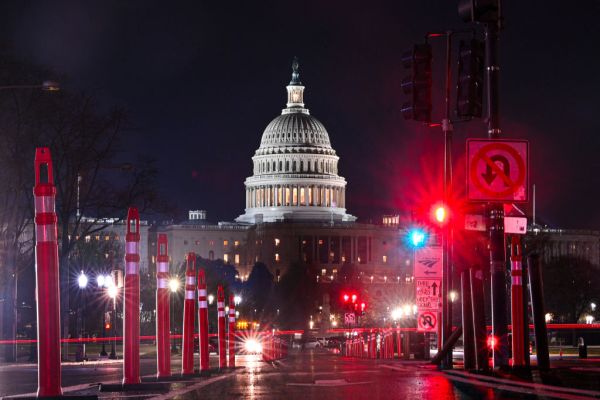Seventy-five years ago, a federal court in New York issued one of the most destructive decisions in the history of American law. Bizarre as it sounds, that ruling, called United States v. Alcoa, essentially made it illegal for businesses to succeed through hard work, and established a precedent that threatened the competition and efficiency upon which economic growth depends. It took decades for legal scholars to persuade judges to abandon that foolhardy rule, and adopt a more pro-competitive principle called the “consumer welfare standard” instead. Their success led to an explosion of innovation and vast improvements in the standard of living. But today, in supporting antitrust actions against Google and Facebook, intellectuals on both the left and right are trying to eliminate that rule and move backwards to a day when antitrust laws served to punish economic success.
The Alcoa case was the brainchild of Thurman Arnold, a Columbia law professor whom Franklin Roosevelt chose to lead the Justice Department’s antitrust division in 1938 after Arnold published a book denouncing capitalism as a myth that rich people use to control the working class. But Arnold was not so much a radical as a Machiavellian cynic who believed that all “social creeds, law, economics, and so on” were forms of “mysticism” with “no meaning whatever.” Instead, government was solely a question of power—and he brought that mindset to the Justice Department when he was put in charge of a vastly expanded team of antitrust lawyers. Heavy new taxes and regulations adopted in 1936 had led to a downturn that his opponents called “the Roosevelt Depression,” but which the president thought was actually a secret plot by capitalists to undermine the New Deal by refusing to hire new employees or increase output. Arnold was charged with pursuing the president’s vendetta.
There was no evidence of a conspiracy, and to the extent that there was any economic theory behind this idea, it was absurd. For decades, progressives such as Louis Brandeis had argued that businesses tend to consolidate and, by outperforming other businesses, cause unemployment and misery. “Bigness” was therefore itself a “curse”—regardless of whether companies became big by satisfying customers—and government should aim to protect small businesses against competition by more efficient rivals. In practice, this meant policies that effectively made it illegal to reduce prices or improve productivity, and that forced customers to subsidize firms that couldn’t compete fairly.
If bigness was bad, then Alcoa—the Aluminum Company of America—was a prime target. In 1938, it had no effective competition in the production of aluminum, thanks to patents it had lawfully purchased and, more importantly, its extensive, cutting-edge research and innovation. It had developed ingenious new ways to extract aluminum from ore, which enabled it to outperform any potential competitors. Alcoa did not sabotage rivals or steal industrial secrets to become the market leader; it produced good products at reasonable prices.
That was not enough to avoid prosecution, however, thanks to the vagueness of the nation’s antitrust laws. The Sherman Act of 1890 prohibits “every contract, combination … or conspiracy, in restraint of trade,” but never defines these terms. If a supplier offers a discount to large retailers that it denies to small retailers, is that a “restraint of trade”? And there are times when agreements not to compete can actually make people better off. Apprentices, for example, traditionally have been asked to agree not to compete against their teachers for a certain amount of time, because otherwise nobody would teach their own competitors. Should they be prohibited? Even the act’s authors didn’t know the answers to these questions—so they essentially left them to courts to decide. That gave federal judges extraordinary power to outlaw major aspects of the American economy, and created a legal system that encourages businesses to invest their money in suing more successful rivals instead of finding better ways to compete for the customer’s dollar.
Despite these risks—and despite the fact that there was no evidence Alcoa had become an industrial giant through cheating—Arnold and his team of hundreds of prosecutors brought the company to trial in June 1938. The case was a bloated monstrosity, involving more than 150 witnesses and some 15,000 pages of documents. It lasted for more than two years, making it the longest in federal history up to that point. But when it was over, Judge Francis Caffey exonerated the company in a 200-page opinion that declared that the entire lawsuit had been an injustice. Alcoa had succeeded through legitimate hard work and innovation, he wrote, and far from acting unfairly, it had been surprisingly generous in assisting even its own would-be competition. “Competitors as well as customers,” Caffey observed, “completely exculpated Alcoa from blame and have praised its fairness as well as its helpfulness to the aluminum industry.” It would be “greatly contrary to the public interest either to dissolve or to enjoin Alcoa,” as Arnold was demanding.
But that victory was short-lived. The government appealed, and in March 1945, the 2nd Circuit Court of Appeals unanimously ruled that Alcoa had broken the law precisely by being so competent. The fact that it had never engaged in illegal behaviors was irrelevant, declared Judge Learned Hand—Alcoa had become an illegal monopoly by “always anticipat[ing] increases in the demand for ingot and be[ing] prepared to supply them.” The company had “doubl[ed] and redoubl[ed] its capacity before others entered the field,” which ensured it would become the leading aluminum company—and that was illegal.
In Hand’s view, for Alcoa to “embrace each new opportunity as it opened, and to face every newcomer with new capacity already geared into a great organization, having the advantage of experience, trade connections and the elite of personnel” was a means of excluding competition prohibited by federal law. As for Alcoa’s argument that it had succeeded “by virtue of his superior skill, foresight and industry,” this was irrelevant, Hand said; to “limit” the Sherman Act to penalizing improper actions “would in our judgment emasculate the Act; would permit just such consolidations as it was designed to prevent.” In other words, as antitrust scholar Dominick Armentano observes, Hand’s decision made “business efficiency ‘exclusion’ and a restraint of trade.”
Hand’s notion that it violated the Sherman Act for a company to succeed by satisfying customers—which was endorsed only a year later by the Supreme Court—threatened the very basics of free enterprise. It was bad for business owners, who could never predict when they might be punished for outcompeting other companies. But it was also bad for consumers, who benefit from low prices and improved quality.
Beginning in the 1970s, however, a group of legal scholars based at the University of Chicago began challenging this theory. They argued that antitrust laws should prioritize the interests of consumers, not less-efficient businesses, and encourage companies to reduce costs and improve output. Punishment should be reserved for those companies that tried to exploit their power in ways that raised prices or prevented new goods from reaching the market. They called this theory the “consumer welfare standard,” and it made remarkable progress in the years that followed. For example, in 1993, the Supreme Court relied on the standard when it cautioned courts against expansively interpreting laws against “predatory pricing.” Low prices, it observed, are “a boon to consumers,” and judges should avoid obstructing them when possible.
For a generation now, the consumer welfare standard has helped foster a dynamic economy in which business innovations have reduced the cost of living and improved the variety of products and services available to buyers. Largely freed from the threat that wise business choices will incur prosecution, companies have found new ways to lower costs while continuing to innovate. Most importantly, the consumer welfare standard has made it harder for unsuccessful businesses to sue their way to the top.
In recent years, however, activists on both the left and right have begun arguing that courts should abandon the consumer welfare standard, which they see as encouraging economic inequality or as allowing companies to do things they disapprove of, and to adopt what they call a “public interest” or “effective competition” standard instead. What precisely these terms mean is not entirely clear, except that they would maximize government control over how businesses operate. Whatever term is used, this fad is—in the words of law professor Joshua Wright—just a rehash of the “populist notions” of Arnold’s day, when government tried to “advance a variety of social and political goals at the expense of American consumers.”
This debate might seem academic except for a report issued last month by a House subcommittee, which openly argues against the consumer welfare standard. The report—written by the committee’s lawyers, without input from any economists—complained that antitrust enforcers have focused on low prices instead of “a fair economy” and “democratic ideals.” It marks a dangerous first step backward, toward an era in which the government punished businesses for being successful, innovative, and hardworking—and rewarded others for satisfying the desires of politicians. And the second step may have been taken days ago, in the form of lawsuits filed against Facebook and Google—in which prosecutors make little effort to even claim that the companies harmed consumers. These lawsuits are obvious efforts to vindicate politically motivated grudges against these companies rather than to enforce any coherent economic policy.
“The adoption of the consumer welfare standard,” notes Wright, “ushered in an economic revolution” that reined in the politicized notion of antitrust that prevailed 75 years ago—a notion under which power-hungry politicians sued conscientious and hardworking businesses that had succeeded by selling customers things they wanted at prices they could afford. But as the nation slogs through one of the worst economic crises in memory, what we need is more room for competition free of the threat of arbitrary government meddling. Seventy-five years after the awful Alcoa decision, it’s critical to preserve the consumer welfare standard—and the free markets it protects.
Disclosure: The Dispatch is a participant in Facebook’s third-party fact-checking project.
Timothy Sandefur is vice president for litigation at the Goldwater Institute, which is a member of the Alliance on Antitrust.







Please note that we at The Dispatch hold ourselves, our work, and our commenters to a higher standard than other places on the internet. We welcome comments that foster genuine debate or discussion—including comments critical of us or our work—but responses that include ad hominem attacks on fellow Dispatch members or are intended to stoke fear and anger may be moderated.
You are currently using a limited time guest pass and do not have access to commenting. Consider subscribing to join the conversation.
With your membership, you only have the ability to comment on The Morning Dispatch articles. Consider upgrading to join the conversation everywhere.